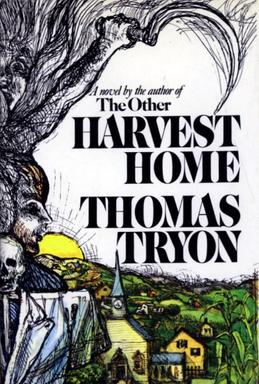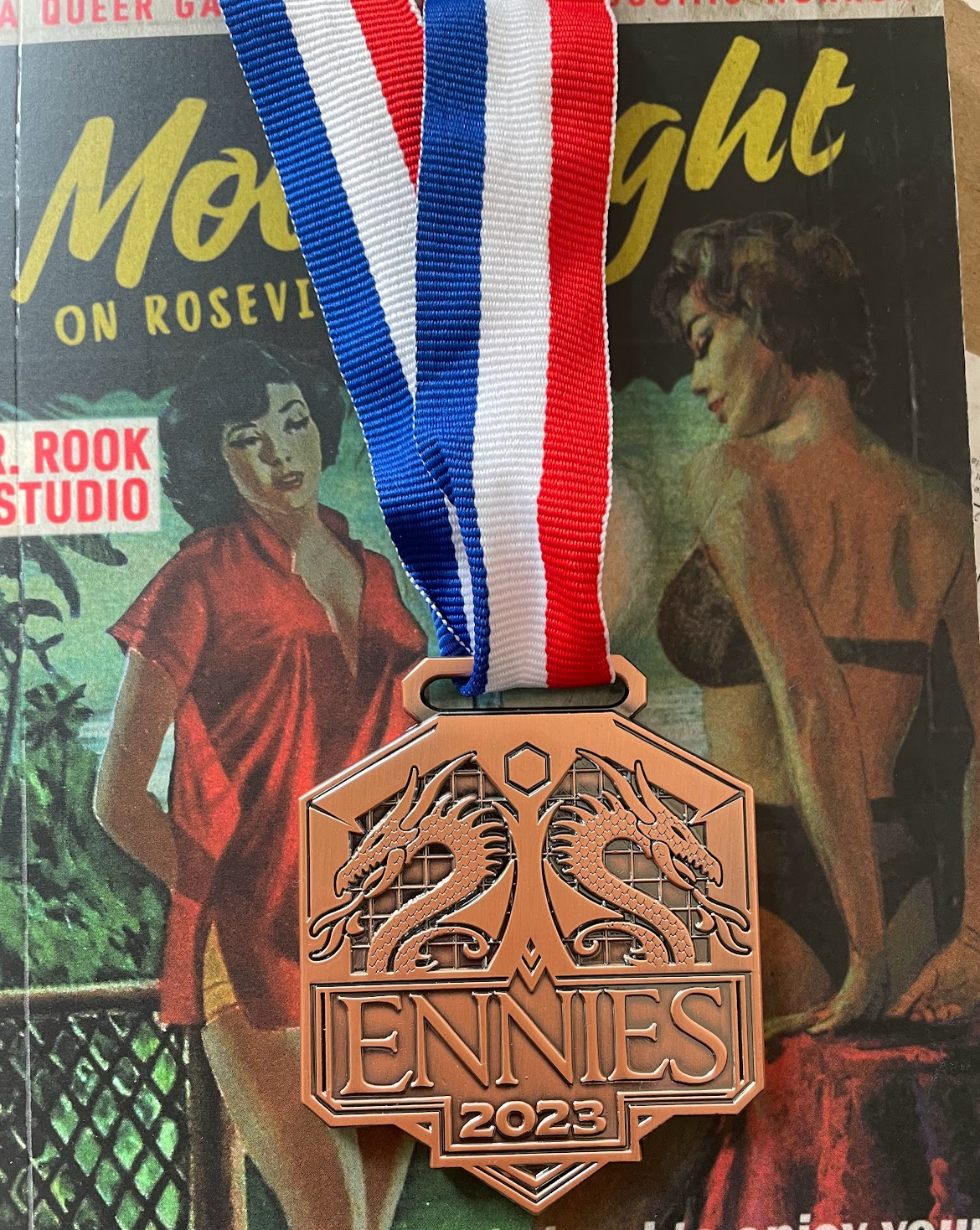Roseville Beach Reading: Thomas Tryon's Harvest Home
Beach Reading: Thomas Tryon’s Harvest Home

This is a series about beach reads in the summer of 1979: pop fiction and pulp fiction that might show up on the shelves of Sandy Perez’s Paperback Exchange & Newsstand in the back of The Market in Roseville Beach. These aren’t formal reviews, just quick read-throughs with an eye to how ideas from the book could inform your Roseville Beach game.
Thomas Tryon’s 1973 horror novel Harvest Home was folk horror in the tradition of Shirley Jackson’s 1948 story “The Lottery” or the film The Wicker Man (also 1979): a remote community seems quaint—even bucolic—if insular. However, they’re hiding dark secrets that everyone there seems to know already.
Spoiler Warning: This series of posts are about books at least 40 years old, sometimes older, specifically looking at what kinds of game sessions they might inspire. That means there will often be spoilers. I won’t try to mark them individually: if you prefer to avoid spoilers, you’ll want to skip this post.
The Author
Thomas Tryon had a moderately successful Hollywood career before his mid–40s when he decided to change paths and become a novelist. His first novel, The Other in 1971, is regarded as one of the novels that helped make horror a best-selling category (along with Carrie, Rosemary’s Baby, and The Exorcist). Like his debut book, Harvest Home made the best-seller lists but was mostly ignored by critics.
The Book
The book centers on Ned Constantine, a former NYC ad executive who’s decided to be a painter and has moved to the remote New England village of Cornwall Coomb with his wife and their daughter. Tryon establishes Ned as emotionally immature and prone to anger, though since we only see through Ned’s POV, we only get one or two hints at how that’s affected his relationships and life, and we don’t get a clear sense of whether he’s an unreliable narrator: Ned certainly self-identifies as someone who lacks strong passions (though he becomes passionately obsessed with some of the town’s mysteries and disappearances).
Charmed by their old home and the remote locale, they become friends with Widow Fortune, the town’s matriarch. They discover that most of the town’s old farming families are descended from Cornish farmers who came to New England in the 17th and 18th centuries, bringing many of their traditional ways.
Luckily, they’ve moved to town as they prepare for their seventh-year planting and harvest festival. While the town observes the seasonal festivals every year, the seventh year is when they select a new “Harvest Lord” and “Corn Maiden.”
It quickly becomes apparent that there’s a darker side to this than the Constantines’ guess: When Ned spies on a group of the town’s young men at the town’s late spring “Agnes Fair,” he discovers an entranced pre-teen girl choosing a new Harvest Lord from among them based on her reading of a sheep’s entrails. While most of the town’s young men seem eager to be chosen, the young man she chooses—Worthy, Ned’s 16-year-old handyman on whom his daughter has a crush—is dismayed. It’s worth noting here that Thomas Tryon was a former Hollywood actor who was publicly closeted but privately gay. He had multiple long-term relationships after he left acting, took up writing, and moved to NYC. I’ve joked that you can tell that much about him from the different ways he describes men and women, but it also comes out in the subplot surrounding Worthy. Much of the book about Worthy—an attractive young man who ultimately chooses increasing ostracization and death rather than submit to the heterosexual rites the town demands—can be easily read as a critique of heterosexuality. Still, it’s a gay-man-centric and often misogynistic critique that views women as the source of men’s problems.
As spring turns to summer and summer to fall, the Widow Fortune helps Ned’s daughter Kate with her asthma. After a brutal attack that the region’s doctor thinks is fatal, the Widow performs an emergency tracheotomy and treats her with herbal medicines, ultimately curing her completely. When Ned and his wife Beth try and have a second child, the Widow gives them fertility treatments, including mead brewed with hallucinogenic Fly Agaric. She and Ned continue to become friends until the town learns that Ned has given young Worthy money to run away from home. Meanwhile, Ned’s been researching the disappearance of a young woman seven years before and also sensing that Sophie, the wife of the town’s current Harvest Lord—a tall, muscular, and handsome farmer named Justin—is increasingly distant and sad.
Ultimately, Ned learns that the town practices a syncretistic blend of protestant Christianity and the Eleusinian Mysteries and that while the town’s church has a pastor, the town’s real religion is lead by the Widow Fortune. Ned’s increasingly shunned by the town’s families until he discovers that they’ve captured and killed Worthy (whose whereabouts they found when the postmistress steams open Ned’s letters), and during the festival of Harvest Home, he spies on the women’s ritual in the church and procession out to the forest where they kill Justin, the outgoing Harvest Lord, during a sexual rite.
Cornwall Coomb & Roseville Beach
I have a hard time with the notion that when gentrifying forces (and Ned Constantine and his family are definitely gentrifying forces) come to a small town of rural farmers, the real problem is the rural farmers, so I’d skip the folk horror aspect and take an approach to the small-town cult more like Shudder’s 2019 movie Spiral, perhaps with monied elites returning to ancestral homes in the summer for mystery rites. The cult could draw people to neighboring towns: unwilling participants who’ve tried to escape the town’s mystery cult, people fleeing being sacrificed (or sacrificers), or people trying to rescue the cult’s victims.
Rob Abrazado, Eric Moore, and I added strange sorcerers (including immortal alchemists, an alligator shifter, and those who hear mysterious alien messages) to most towns on Rose Island (though Roseville Beach’s resident sorcerer disappeared in the summer of ’78) and any of them could be at the center of a secret society or mystery cult.
Dim All the Lights, the first mystery book for Moonlight on Roseville Beach, will include new scenarios from Richard Ruane and Sharang Biswas, new stand-alone mini-games from Ezakur and Richard, creatures and mystery starters from Noora Rose and Richard Ruane, and new fiction from Bendi Barrett and R.J. Ryan. Sign up to follow along!

Comments
Post a Comment